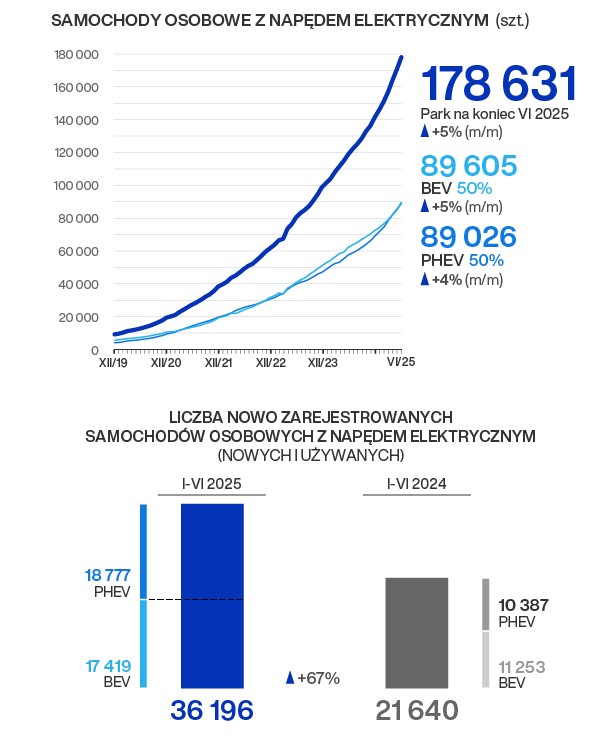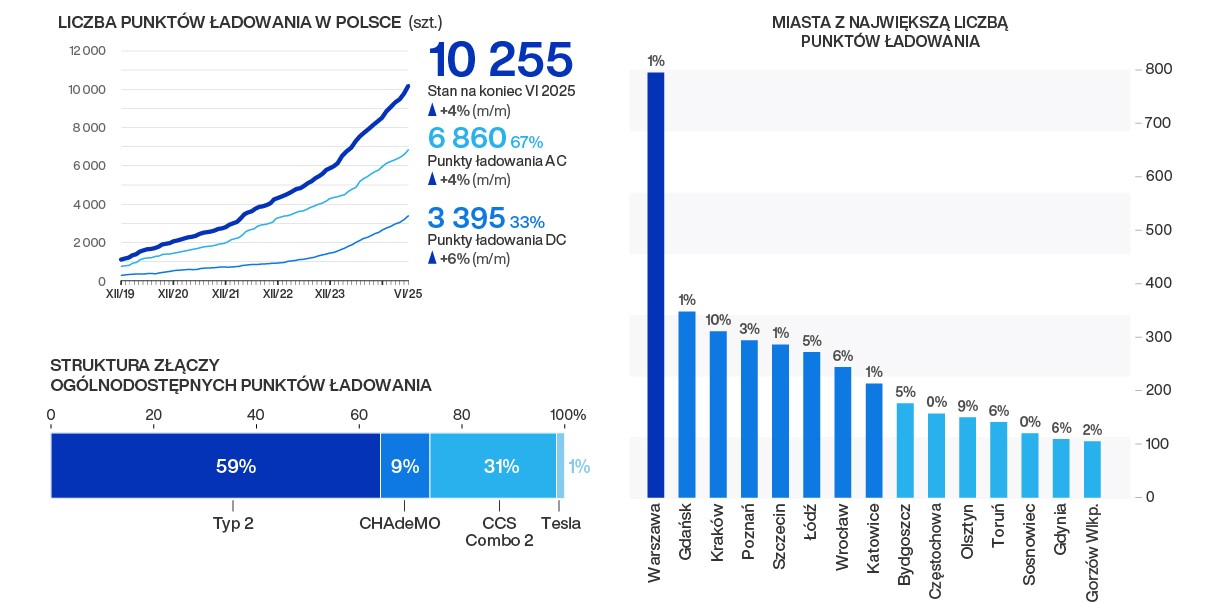Electric cars are becoming increasingly popular in Poland. Another record is set.

- Jan Wiśniewski from PSNM says that June was another month in a row when a record market share of passenger electric cars was recorded – almost 8 percent.
- Jakub Faryś from PZPM admits that the record results in the registration of zero-emission vehicles in the last few months - including in June - show how important it is to support this market.
- In parallel with the expansion of the electric vehicle fleet, the charging infrastructure is expanding. By the end of June 2025, there were 10,255 publicly accessible charging points in Poland.
- At the end of June 2025, there were 178,631 electric passenger cars on Polish roads. The fleet of fully electric passenger cars (BEVs, battery electric vehicles) numbered 89,605, and the fleet of plug-in hybrid electric vehicles (PHEVs, plug-in hybrid electric vehicles) numbered 89,026, according to the Electromobility Counter launched by the Polish Automotive Industry Association (PZPM) and the Polish Association of New Mobility (PSNM).

The number of electric vans and trucks amounted to 9,307. The fleet of electric mopeds and motorcycles is constantly growing, consisting of 25,630 at the end of June, as well as the number of hybrid passenger cars and vans, which increased to 1,121,774.
At the end of June, the number of zero-emission buses in Poland increased to 1,583 - of which 1,481 were fully electric vehicles and 100 were hydrogen vehicles.
The charging infrastructure is expanding in parallel with the electric vehicle fleet. At the end of June 2025, there were 10,255 publicly accessible electric vehicle charging points in Poland. Of these, 33% were fast direct current (DC) charging points, while 67% were slow alternating current (AC) charging points with a power output of less than or equal to 22 kW.

"June was another consecutive month when we saw a record market share for passenger electric cars – almost 8%. This is almost three times better than the end of 2024, but still more than half the EU average. That's why it's so important to continue subsidies after the NaszEauto program ends in the middle of next year. A solution could be a social leasing program, a draft of which was submitted by PSNM as part of the consultation on the government's socio-climate plan," says Jan Wiśniewski, director of the PSNM Research and Analysis Center.
As he explains, the socio-climate plan is a document that determines the direction of subsidies from the Social and Climate Fund (SCF), an EU instrument intended to combat transport exclusion related to the introduction of the new emissions trading system (ETS2).
"The leasing proposal, which includes 100% subsidy on the initial payment and a monthly payment of approximately PLN 300-400 for a new car, perfectly aligns with the FSK's goals, significantly increasing the availability of zero-emission transport. A similar program has already proven successful in France, among other places," adds Jan Wiśniewski.
Subsidies from the National Transport Authority (KPO) resulted in an increase in the registration of electric vehicles"The record-breaking zero-emission vehicle registrations in the last few months – including June – demonstrate the importance of supporting this market. The launch of the KPO subsidy program has led to a significant increase in registrations of zero-emission passenger cars. In this context, we are encouraged by the announcement by the Ministry of Climate and Environment that a review of applications will soon be conducted, and we can hope that individuals and sole proprietorships wishing to purchase zero-emission delivery vehicles will join the program's beneficiaries," emphasizes Jakub Faryś, President of the Polish Automotive Association (PZPM).
He emphasizes that while this does not guarantee that all program funds will be used, it will certainly be an excellent boost for the program.
"The question of expanding the program's beneficiaries to include companies remains open. Although the European Commission has not agreed to this, we hope that the responsible ministries will reopen the discussion. I would like to point out once again that charging infrastructure is developing at a very rapid pace (approximately 50% annually). Currently, there are over 10,000 charging points in Poland – one-third of which are fast chargers. This is crucial because many customers base their purchase of a zero-emission vehicle on the condition and quality of the infrastructure," emphasizes Jakub Faryś.
wnp.pl





